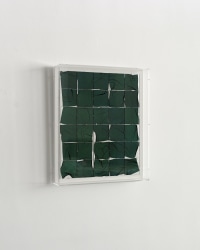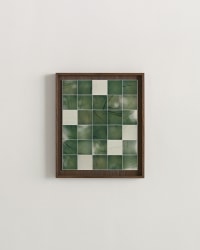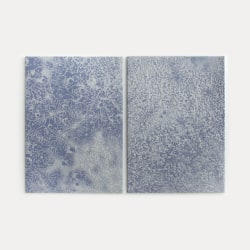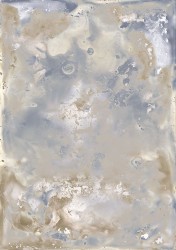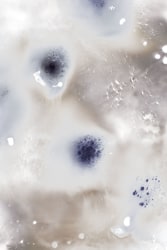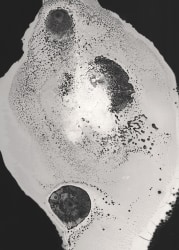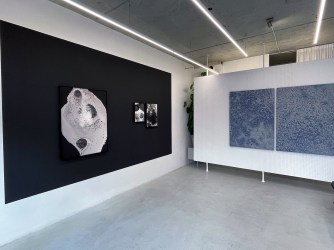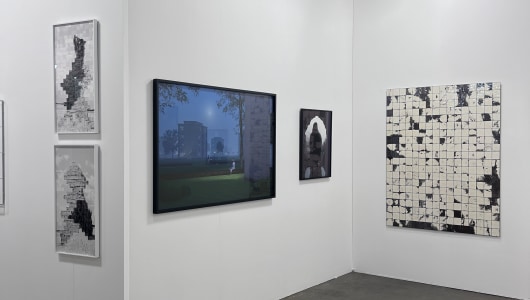Inloggen
Registreren
NL
My work derives from the concept of material thinking, where the intuitive and experimental interaction with matter comes prior to linguistic thought. I’m interested in the transience of our natural world, and how we as human beings relate to, experience and perceive this - in a practical sense as physical entities who ourselves are part of this natural world and are submissive to a constant flux, and in a philosophical sense as a way of meaning making of the ever-changing world around us.
In the process of creation, I’m guided by the direction the material itself takes, and I see myself as the facilitator of and respondent to these processes, in which craftsmanship is an important aspect. By implementing photographic techniques, I can distance myself from the captured object, letting it reside in its inherent rhythm of growth and decay, while the photographic image or imprint is positioned as a trace of a fleeting moment. In using these techniques, I try to unravel its components such as light, time and movement, in order to research and question our perception of what is real and whether we can know the essence of the experienced phenomena. By using the aesthetics of these processes of movement, I attempt to create space for understanding and acceptance of what will disappear.
Simultaneously, I am interested in the way the interaction with matter - in this case the artwork - on the side of the viewer can contribute to the way we experience and understand our surroundings, as a form of embodied knowledge production. By not only using natural materials and transient processes in the creation of an image, but also in the (re)production of it, I try to create work that enters a new process, leaving the viewer responsible for the lifespan of the work, and aware of the impact of the environment it is exposed to. In doing so, I aim to emphasize the idea of connectivity and responsibility for our surroundings.
BIO
Tjitske Oosterholt (1991, Amsterdam, The Netherlands) has moved from graphic design (BA) and artistic research (MA) into a more in-between state of creative practice, where she aims to combine both intuitive and experimental visual imagery mainly through the use of photographic techniques, with research on our experience and perception of and being in the world. With a growing desire to contribute to a more sustainable, circular and responsible approach to art practice, Tjitske’s interest in the transience of the natural world and our relationship to it is taking a centre stage in all creative explorations.
“I believe the power of art lies in its non-linguistic forms: in the way you can think with and through material by means of interactions, without using words. Therefore I focus on the use of my intuition rather than a previously outlined concept. By letting the material go its own way, I can discover new combinations and interesting textures, which guide me into further visual and theoretical explorations. As an artist, I think it’s very important to realize and admit that the material (be this the material I work with or everything that’s happening around me) is so much more in charge than myself. An artist is not a mastermind, it’s just someone who’s endlessly curious.”
In the process of creation, I’m guided by the direction the material itself takes, and I see myself as the facilitator of and respondent to these processes, in which craftsmanship is an important aspect. By implementing photographic techniques, I can distance myself from the captured object, letting it reside in its inherent rhythm of growth and decay, while the photographic image or imprint is positioned as a trace of a fleeting moment. In using these techniques, I try to unravel its components such as light, time and movement, in order to research and question our perception of what is real and whether we can know the essence of the experienced phenomena. By using the aesthetics of these processes of movement, I attempt to create space for understanding and acceptance of what will disappear.
Simultaneously, I am interested in the way the interaction with matter - in this case the artwork - on the side of the viewer can contribute to the way we experience and understand our surroundings, as a form of embodied knowledge production. By not only using natural materials and transient processes in the creation of an image, but also in the (re)production of it, I try to create work that enters a new process, leaving the viewer responsible for the lifespan of the work, and aware of the impact of the environment it is exposed to. In doing so, I aim to emphasize the idea of connectivity and responsibility for our surroundings.
BIO
Tjitske Oosterholt (1991, Amsterdam, The Netherlands) has moved from graphic design (BA) and artistic research (MA) into a more in-between state of creative practice, where she aims to combine both intuitive and experimental visual imagery mainly through the use of photographic techniques, with research on our experience and perception of and being in the world. With a growing desire to contribute to a more sustainable, circular and responsible approach to art practice, Tjitske’s interest in the transience of the natural world and our relationship to it is taking a centre stage in all creative explorations.
“I believe the power of art lies in its non-linguistic forms: in the way you can think with and through material by means of interactions, without using words. Therefore I focus on the use of my intuition rather than a previously outlined concept. By letting the material go its own way, I can discover new combinations and interesting textures, which guide me into further visual and theoretical explorations. As an artist, I think it’s very important to realize and admit that the material (be this the material I work with or everything that’s happening around me) is so much more in charge than myself. An artist is not a mastermind, it’s just someone who’s endlessly curious.”
Kunstwerken
Articles
Media
Highlights
Over de kunstenaar
In collectie van
Tentoonstellingen
Marktpositie
CV
Aangeboden kunstwerken van Tjitske Oosterholt
Articles on Tjitske Oosterholt
Media

Looking up! Glorious images from rising stars – in pictures
Martica, 2025 by Rose Marie Cromwell
From adventures in adolescence to Venezuelan dancers, these images from new artists have been nominated for the Photo London Nikon emerging photographer award!
https://www.theguardian.com/artanddesign/gallery/2025/may/15/photo-london-nikon-emerging-photographer-award-pictures
Tentoonstellingen
In bedrijfscollectie van:
Universiteitsbibliotheek Leiden
Marktpositie
Tjitske Oosterholt (1991, Amsterdam), is a contemporary artist known for her experimental and intuitive approach to materiality. Originally trained in graphic design, she earned her bachelor’s degree from the Royal Academy of Art in The Hague in 2014. Oosterholt later pursued a Master’s in Artistic Research at the University of Amsterdam, although she ultimately chose not to complete the degree. Her background has shaped a unique, research-driven approach to her creative practice, blending graphic design techniques with philosophical inquiries into human perception and natural transience.
Tjitske’s artistic practice is rooted in material thinking, where intuition and hands-on experimentation with materials take precedence over verbal expression. She explores the transient nature of the world and our physical and philosophical connection to it, embracing the inherent impermanence of all things. Working with Polaroids, Tjitske allows the medium’s unpredictable qualities to guide her creative process, embracing the mystery and uncontrollable aspects of the image as it develops. This openness to the unknown extends to collages, where unexpected juxtapositions create a dialogue with the unfamiliar, inviting both Tjitske and the viewer to find beauty and peace in the uncertainties of life.
Since 2014, Oosterholt has maintained a consistent presence in the art world, exhibiting her work extensively in the Netherlands and internationally. Her participation in art fairs and exhibitions include numerous group and solo showcases in Portugal, including Duplex AIR in Lisbon and PADA studios in Barreiro. Through these consistent exhibitions from 2014 up to this day, Oosterholt has steadily advanced her reputation, establishing herself as an influential voice in contemporary art, particularly with her thought-provoking exploration of material and perception. In 2025 she was shortlisted for the Photo London x Nikon Emerging Photographer Award.
Oosterholt’s contributions have also been recognized through several grants and funding opportunities, most notably from the Mondriaan Fund, which awarded her project funding for "Navigating Mystery" in 2023 and "Mirroring Landscapes" in 2021-2022, alongside a stipend for emerging artists in 2020-2021. These grants underline the cultural value and innovation seen in her work, marking her as an artist whose projects are considered deserving of national support. The backing of these prestigious grants affirmed her credibility. Furthermore, residencies at Duplex AIR in Lisbon, PADA Studios in Barreiro, arte ventura in Spain, and AGA Lab in Amsterdam have allowed her to deepen and solidify her practice, enriching her conceptual and technical approach. These residencies not only provided her with time and space to experiment but also helped stabilize the status of her work within the contemporary art world.
Tjitske’s artistic practice is rooted in material thinking, where intuition and hands-on experimentation with materials take precedence over verbal expression. She explores the transient nature of the world and our physical and philosophical connection to it, embracing the inherent impermanence of all things. Working with Polaroids, Tjitske allows the medium’s unpredictable qualities to guide her creative process, embracing the mystery and uncontrollable aspects of the image as it develops. This openness to the unknown extends to collages, where unexpected juxtapositions create a dialogue with the unfamiliar, inviting both Tjitske and the viewer to find beauty and peace in the uncertainties of life.
Since 2014, Oosterholt has maintained a consistent presence in the art world, exhibiting her work extensively in the Netherlands and internationally. Her participation in art fairs and exhibitions include numerous group and solo showcases in Portugal, including Duplex AIR in Lisbon and PADA studios in Barreiro. Through these consistent exhibitions from 2014 up to this day, Oosterholt has steadily advanced her reputation, establishing herself as an influential voice in contemporary art, particularly with her thought-provoking exploration of material and perception. In 2025 she was shortlisted for the Photo London x Nikon Emerging Photographer Award.
Oosterholt’s contributions have also been recognized through several grants and funding opportunities, most notably from the Mondriaan Fund, which awarded her project funding for "Navigating Mystery" in 2023 and "Mirroring Landscapes" in 2021-2022, alongside a stipend for emerging artists in 2020-2021. These grants underline the cultural value and innovation seen in her work, marking her as an artist whose projects are considered deserving of national support. The backing of these prestigious grants affirmed her credibility. Furthermore, residencies at Duplex AIR in Lisbon, PADA Studios in Barreiro, arte ventura in Spain, and AGA Lab in Amsterdam have allowed her to deepen and solidify her practice, enriching her conceptual and technical approach. These residencies not only provided her with time and space to experiment but also helped stabilize the status of her work within the contemporary art world.
CV
CURRICULUM VITAE TJITSKE OOSTERHOLT
EDUCATION
2015 - 2017 MA Artistic Research at University of Amsterdam - Amsterdam, NL (not graduated)
2010 - 2014 BA Graphic Design at Royal Academy of Art - The Hague, NL (graduated)
(GROUP) EXHIBITIONS
2024 ‘Segments of Nature’ duoshow at Contour Gallery, Rotterdam, NL
2023 ‘Taking the Light out of the Prism’ with Duplex AIR - Lisbon, PT
2023 ‘Unseen Amsterdam’ with Contour Gallery - Amsterdam, NL
2022 ‘Unseen Amsterdam’ with Contour Gallery - Amsterdam, NL
2022 ‘Prospects’ at Art Rotterdam - Rotterdam, NL
2021 ‘Paralaxe’ at PADA studios - Barreiro, PT
2021 ‘Print & Play - On Display’ - online
2021 ‘Paper, Rock, Scissors, a visual exploration of photography’ at Contour Gallery - Rotterdam, NL
2020 ‘De Kijkdoos’ at OPEN! Rotterdam - Rotterdam, NL
2016 ‘Mattering Matter’ at Hotel Maria Kapel - Hoorn, NL
2016 ‘Intervention - Work in progress’ at Stedelijk Museum Bureau Amsterdam - Amsterdam, NL
2015 ‘MAKE SENSE’ by buroBG at pop-up location - Amsterdam, NL
2014 ‘KABK Alumni Graphic Design’ at Dutch Design Week - Eindhoven, NL
(SOLO) EXHIBITIONS
2023 ‘A Continual Unfolding’ at de Bouwput - Amsterdam, NL
2022 ‘Mineral Evolution’ at Contour Gallery - Rotterdam, NL
GRANTS / FUNDING
2023 project funding ‘Navigating Mystery’ by Mondriaan Fund
2021 - 2022 project funding ‘Mirroring Landscapes’ by Mondriaan Fund
2020 - 2021 stipendium for emerging artists by Mondriaan Fund
RESIDENCIES
2022 residency at Duplex AIR - Lisbon, PT
2021 residency at PADA studios - Barreiro, PT
2021 residency at arteventura - Corteconception, ES
2020 residency at AGA Lab - Amsterdam, NL
2016 Guest Researchers Residency at the Museu d’Art Contemporani de Barcelona - Barcelona, ES
EDUCATION
2015 - 2017 MA Artistic Research at University of Amsterdam - Amsterdam, NL (not graduated)
2010 - 2014 BA Graphic Design at Royal Academy of Art - The Hague, NL (graduated)
(GROUP) EXHIBITIONS
2024 ‘Segments of Nature’ duoshow at Contour Gallery, Rotterdam, NL
2023 ‘Taking the Light out of the Prism’ with Duplex AIR - Lisbon, PT
2023 ‘Unseen Amsterdam’ with Contour Gallery - Amsterdam, NL
2022 ‘Unseen Amsterdam’ with Contour Gallery - Amsterdam, NL
2022 ‘Prospects’ at Art Rotterdam - Rotterdam, NL
2021 ‘Paralaxe’ at PADA studios - Barreiro, PT
2021 ‘Print & Play - On Display’ - online
2021 ‘Paper, Rock, Scissors, a visual exploration of photography’ at Contour Gallery - Rotterdam, NL
2020 ‘De Kijkdoos’ at OPEN! Rotterdam - Rotterdam, NL
2016 ‘Mattering Matter’ at Hotel Maria Kapel - Hoorn, NL
2016 ‘Intervention - Work in progress’ at Stedelijk Museum Bureau Amsterdam - Amsterdam, NL
2015 ‘MAKE SENSE’ by buroBG at pop-up location - Amsterdam, NL
2014 ‘KABK Alumni Graphic Design’ at Dutch Design Week - Eindhoven, NL
(SOLO) EXHIBITIONS
2023 ‘A Continual Unfolding’ at de Bouwput - Amsterdam, NL
2022 ‘Mineral Evolution’ at Contour Gallery - Rotterdam, NL
GRANTS / FUNDING
2023 project funding ‘Navigating Mystery’ by Mondriaan Fund
2021 - 2022 project funding ‘Mirroring Landscapes’ by Mondriaan Fund
2020 - 2021 stipendium for emerging artists by Mondriaan Fund
RESIDENCIES
2022 residency at Duplex AIR - Lisbon, PT
2021 residency at PADA studios - Barreiro, PT
2021 residency at arteventura - Corteconception, ES
2020 residency at AGA Lab - Amsterdam, NL
2016 Guest Researchers Residency at the Museu d’Art Contemporani de Barcelona - Barcelona, ES
Gratis Online Magazine
Artikelen, interviews, shows & events. Wekelijks bezorgd in uw mailbox.

